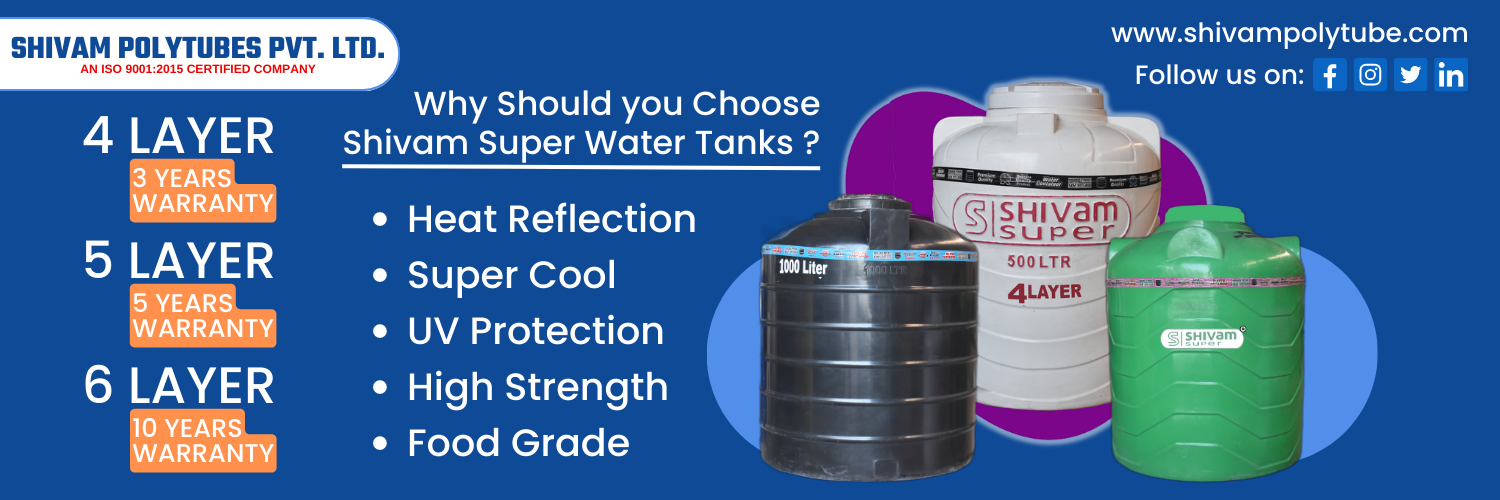Shivam Super plastic water storage tank is a container made from food Grade materials designed to store and hold water. These tanks are commonly used for various purposes, including domestic, commercial, and industrial applications. Plastic water storage tanks offer several advantages, such as durability, cost-effectiveness, and resistance to corrosion and rust. They come in a variety of sizes, shapes, and capacities to suit different needs.
Shivam Super Plastic Storage Water Available in Different shapes, sizes, and configuration, and are used for a variety of purposes across all the water treatment industry and mainly for domestic purposes at our home. Water tanks are an integral part of many of our households’ water systems. There are also tanks inbuilt equipped with UV inhibitors preventing sunlight from facilitating algae and bacteria within the tank.
Here are some key points about plastic water storage tanks:
Materials: Plastic water storage tanks are typically made from polyethylene (PE) or polypropylene (PP) plastics, which are known for their strength, lightweight nature, and resistance to chemicals.
Applications: Plastic water tanks are used for a wide range of applications, including storing drinking water, agricultural irrigation, rainwater harvesting, industrial processes, firefighting, and emergency water supply.
Advantages:
- Corrosion Resistance: Plastic tanks do not corrode or rust like metal tanks, making them suitable for long-term water storage.
- Lightweight: Plastic tanks are relatively lightweight compared to alternatives like concrete or metal, making them easier to transport and install.
- Cost-Effective: Plastic tanks are often more affordable than tanks made from other materials.
- Easy Installation: Plastic tanks are relatively easy to install and require minimal maintenance.
- Customization: These tanks come in various sizes and shapes, allowing for customization based on space and capacity requirements.
Disadvantages:
- UV Degradation: Some plastic tanks can degrade over time when exposed to direct sunlight, leading to reduced lifespan. UV-resistant coatings or proper placement can mitigate this issue.
- Temperature Sensitivity: Extreme temperature fluctuations can affect the structural integrity of plastic tanks.
- Limited Size: Very large water storage needs might require alternative materials due to limitations in the size of plastic tanks.
Installation and Usage: When installing a plastic water storage tank, proper foundation and support are essential. It's important to follow manufacturer guidelines for installation, filling, and maintenance.
Regulations: Depending on your location and the intended use of the tank (e.g., drinking water storage), there may be regulations and standards that need to be followed. Always ensure compliance with local guidelines.
Replacement: While plastic tanks are durable, they have a finite lifespan. Over time, plastic can become brittle or develop cracks, potentially leading to leaks. Regular inspections can help identify signs of wear and tear.
When choosing a Shivam Super plastic water storage tank, consider factors such as the intended use, required capacity, available space, and any specific environmental conditions that might impact the tank's longevity. Always select a tank from a reputable manufacturer and adhere to proper installation and maintenance practices.







Comments